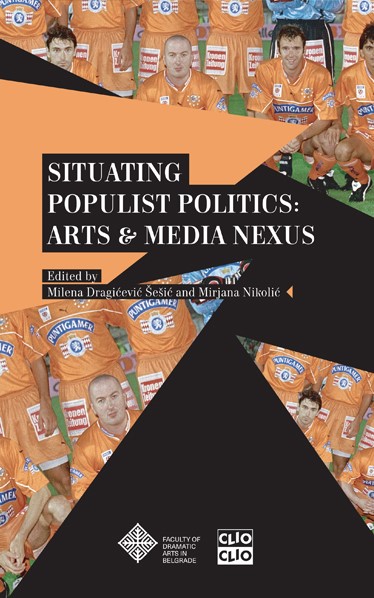Situating Populist Politics: Arts and Media Nexus
€10,00
Nema na zalihi
| Težina | 493 g |
|---|---|
| Format | 15 × 24 cm |
| Autor | |
| Izdavač | |
| Mjesto izdanja | Beograd |
| Godina | 2019 |
| Broj stranica | 298 |
| Uvez | Meki |
| Stanje knjige | Vrlo dobro |
Ostali autori: Mirjana Nikolić Opis: In the year 2016, the research team of the Faculty of Dramatic Arts in Belgrade joined the COST action IS 1308 Populist Political Communication in Europe: Comprehending the Challenge of Mediated Political Populism for Democratic Politics. That has opened an institutionally-supported research area in which we have had the opportunity to cooperate with colleagues from over twelve European universities. The aim was to map populism as an ideology, political doctrine, rhetorical strategy and media practice in the European political and media space. The interest of the Faculty of Dramatic Arts in these topics emerged from our research on contemporary cultural and media policies in Europe. It was obvious that these policies were under the pressure of the neoliberal system and managerial demands on one side, and populist and nationalist political pressures on the other. Attacks on art institutions, performances, festivals and other events, although implemented by individuals and groups of “concerned citizens”, often have not received adequate response from the government, as politicians did not want to confront their “electoral body” that had moved to the right of the political spectrum. Accusations and even the criminalisation of artists (based on blasphemy laws and several UN resolutions condemning “defamation of religion”), although mostly happening outside of Europe (Turkey, Egypt, Pakistan), led to the self-censorship of cultural programmers and cultural institutions which started avoiding so-called controversial and provocative artists. In Serbia there were several examples of such self-censorship: removing the work of Danijela Tasić in Novi Sad Cultural Center; removing the works of the group Kamarades in Belgrade Cultural Center; the closing of an exhibition of visual artists from Kosovo in Context Gallery, etc. The spaces for a plurality of expressions and alternative forms of art were rapidly narrowing in spite of the official policy support for the diversity of creative expression (UNESCO Convention 2005). Even within official cultural and media policies the populist and nationalist narratives began to take more space. This book covers a wide range of topics that show different ways that populist political communication is entering the public realm, but even more to what extent arts, culture and media are influenced by political populism. At the same time, the art works presented in this book offer a wide spectrum of initiatives and projects questioning populism in the public realm and especially in public cultural policies. From the projects of artists such as Yael Bartana and Kristina Norman that deal with ethno-nationalism, work of Lenka Zelenović and Horkeškart addressing both nationalism and social justice, through works that question the seductive power of populist media (Naskovski, Đurić, Prodanović, Schlingensief), to the direct political works of Perjovski and Vocal Curatorial Syndrome that relate to a very concrete political context, and works treating global policies and experiences (Grubanov, Milisković), the art works are in direct dialogue with theoretical texts (Mokre, Spasojević, Weichselbaumer and Gyulas, Vićentijević, Milojević & Krstić, Mlađenović, Cazes and Pyykkonen, Mitov, Radulović, Divac, and Savić).
